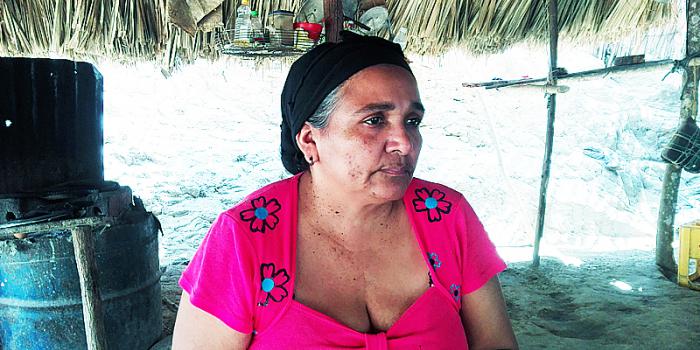
El Salado, The massacre that came back
This township of El Carmen de Bolívar suffered two massacres in three years; most of the victims were executed in the town central square. In the last massacre the paramilitaries had support from helicopters.

By: César A. Marín Cárdenas.
After three years of massacre of March 23, 1997, in which 50 paramilitaries killed five people in the central plaza of the town, no one in El Salado imagined that violence would trace that tragedy only in worse proportions: between 16 and on February 21, 2000, 450 paramilitaries killed 60 people.
After the massacre the exodus of the entire population took place. The majority of inhabitants of this district, the jurisdiction of El Carmen de Bolívar, which belongs to Montes de María region, were devoted to the production of tobacco, yucca, yams, corn, sesame and milk. Among the farmers killed in the 2000 massacre was Mr. José Irene Urueta Guzmán.
"I have very nice memories of my father during my childhood and that of my brothers, he was a very special person with us. He spoiled us all very much; He never raised his hand to punish us, and never heard a bad word or rudeness from him. There is not a single day of my life without my having it in mind, "says Ruth Esther Urueta Sánchez, daughter of Don José Irene.
He was a man with unlimited generosity, according to her, who from childhood taught his seven daughters and a son the work of the field. "We lived at that time on a farm not far from the town, and my dad taught us things from the countryside, such as horseback riding and riding a donkey, throwing water, chopping wood, tearing up a yucca plant, among other things," he recalls. Ruth Esther
When the first massacre occurred, in 1997, the whole family moved to a farm very close to Ovejas, Sucre. Mr. José Irene also took more than 50 head of cattle and pigs from his property to that place, but they only lasted there about seven months and were returned to El Salado. Three years later they already had about 80 head of cattle.
The massacre of February 2000
"I was in Sheep when the massacre happened. My mother told us that my father had the paramilitaries locked in a house and that he had escaped to the sides of the mountain, where the cellular antenna is now (on a hill near the entrance to the town), and that Most people murdered her in the central square of town. "
Hoping that this flight would have reaped its fruit, hope would germinate; nevertheless, the passage of the days without any sign of survival, after the departure of El Salado paramilitaries, began to sow the bad omen.
"About 15 days after the massacre occurred, my father's body was found on that mountain near where the antenna is today. Finally, he was buried in a vault in El Salado cemetery, along with the body of the husband of a niece of my father, who was also killed in the massacre. "
The death of Mr. José Irene brought dire consequences for the home: "My mom got sick, the family was completely broken, the unit was very affected and the economy was damaged because a good part of her father's assets were lost", adds Ruth.
Remember that foundations and entities have been arriving for 15 years to accompany the community in its recovery after the massacre, although she believes that there has been a lack of articulation between the two so that the people of village can leave back those facts that filled our hearts with sadness.
"Here came SEMANA Foundation, the Incoder, Social Action (today Unit for Victims) and other entities to work for the repair of victims. We know that they have already compensated some and others are missing, but I recognize that the accompaniment of these entities has been valuable ".
Ruth also rescues the process with the FARC. "The disarmament of that guerrilla has generated enough tranquility in this region. Until a few years ago the situation here was quite tense, and today without that armed group the thing over here is better."
About forgiveness, she says, "I cannot hate anyone. If someday the people who killed my father ask me for forgiveness, because I will give it to them, because those who do not forgive and hate do not have peace in their lives. "
Today, while Ruth's husband works in the fields, she makes the optimistic teaching of her father every day: "When the harvest comes, it will be good", so, with faith always on high, she searches for sustenance with a machine mending clothes to his neighbors and salting friends, and sewing with hope a better future.






